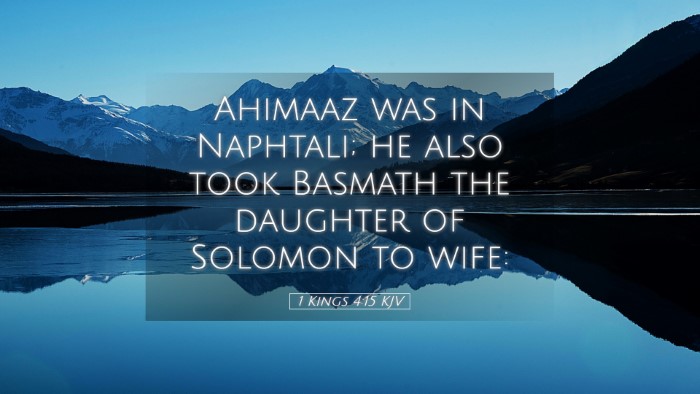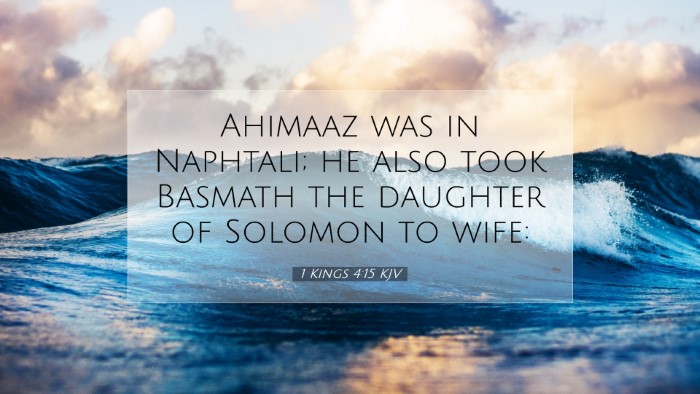Historical Context
This section discusses the historical backdrop of the text.
Under Solomon, Israel experienced greatness in wealth, wisdom, and power. The kingdom was at peace, enabling extensive building and administrative projects. The line-up of officers not only reflects the political acumen of Solomon but also foreshadows the divine intention behind leadership. The officers listed in this chapter serve varied but critical roles in governance, showing a structured approach to statecraft.
Insights from Public Domain Commentaries
Matthew Henry's Commentary
Matthew Henry emphasizes the importance of officers in the kingdom who were both capable and godly men. He notes that Ahijah, mentioned in this verse, was an integral part of Solomon’s administration, handling matters that could affect the spiritual state of the nation. Henry points out that leadership in any capacity requires godliness and the right relationship with God, as it profoundly impacts a community.
This verse indicates Solomon's concern for religious as well as civil governance, as Ahijah was a Man of God. Henry asserts that godly officers are a blessing to the people, affirming that faithful leaders can lead nations on the righteous path.
Albert Barnes' Commentary
Albert Barnes comments on the role of Ahijah the Meronothite, noting his lineage and the honor associated with being connected to notable figures in Israel's history. Barnes highlights the function of this officer as vital for maintaining the household and temple standards during the reign of Solomon. Barnes also discusses how the categorization of these officers served to illustrate the administration's effectiveness.
In his view, Ahijah represents a bridge between the royal governance and God’s decrees, advocating that civil authority should reflect divine order. Thus, it underlines the relationship between the earthly and heavenly governance where human roles are intrinsically linked with God’s overarching command.
Adam Clarke's Commentary
Adam Clarke deeply analyzes the implications of Ahijah’s position in the palace as well as in the temple functions. Clarke observes that he is not merely a title-holder but an active participant in upholding spiritual discipline within the palace. His reference as 'a Man of God' particularly stands out in Clarke’s interpretation, showcasing the biblical notion that those who serve in leadership must be men of integrity and faith.
Clarke warns against separating one’s spiritual life from public service, reinforcing that leaders should embody the teachings and principles of faith in all their governance roles. Clarke's observations shine a light on the necessity for leaders to be exemplary in character and spiritually grounded to navigate the complexities of governance.
Conclusion
1 Kings 4:15 serves as a focal point for understanding the intricate relationship between divine authority and human leadership. The roles filled by individuals like Ahijah remind us that successful governance requires not only wisdom and skill but a commitment to Godliness. The insights from Matthew Henry, Albert Barnes, and Adam Clarke provide a rich landscape for modern application, reminding leaders today to reflect on their covenant with God and the profound responsibility of their offices.


